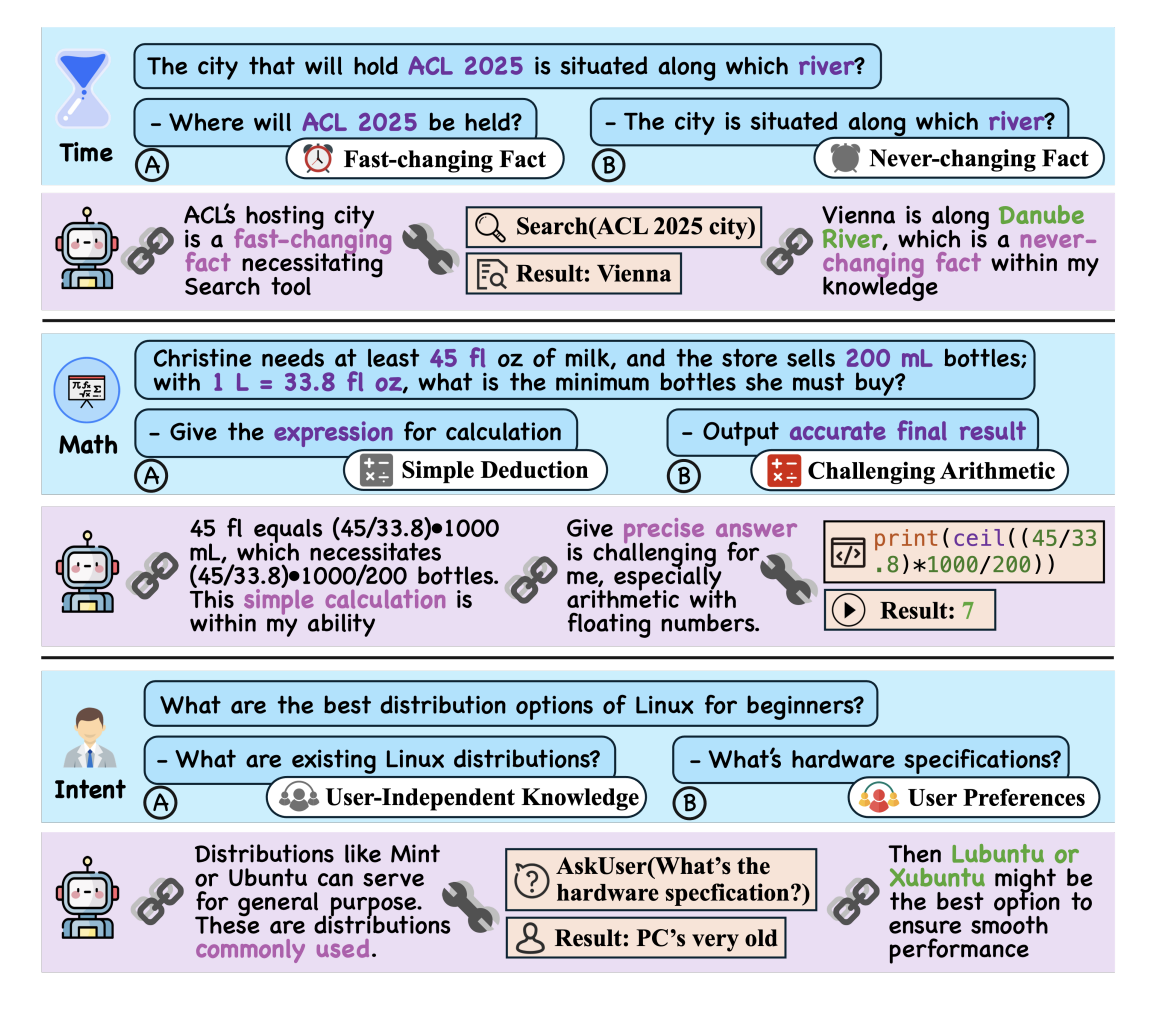The latest progress in LLMs has significantly improved their reasoning skills, enabling them to perform text composition, code generation and logical deduction tasks. However, these models often struggle to balance their internal knowledge and external tool use, leading to tools overuse of tools. This happens when LLMs unnecessarily depend on external tools for tasks that their parametric knowledge can handle, increase calculation costs and sometimes degrading benefits. Studies show that LLMs invoke tools over 30% of the time, even when it is unnecessary, highlighting a lack of self -awareness about their knowledge limits. Tackling this problem requires better calibration mechanisms that allow LLM-driven agents to decide when to rely on their knowledge versus external resources, which ultimately improves efficiency, scalability and user experience.
Research in LLM knowledge boundaries shows that although these models can work well on structured tasks, they often fail to recognize their limitations, leading to hallucinations or wrong tool use. Efforts to tackle these challenges include fetch-reinforced generation, trust calibration and explicit knowledge boundary education. Similarly, studies of tool integration have investigated the use of adaptive tools, external module integration and dynamic calling strategies based on internal uncertainty. Despite these progress, existing benchmarks reveal that LLMs are struggling to determine the necessity and appropriate tool use.
Inspired by human metacognition, researchers from the University of Illinois Urbana-Champaign and IBM Research AI Smart (strategically model conscious reasoning with tools) developed to improve LLMS ‘self-awareness and optimize tool use. They introduced Smart-are, a data set that spans math, time and intention domains that control models to balance internal reasoning with external tools through explicit justifications. Using this data set, Smartagent was trained to reduce the tool overuse by 24%, while the performance is improved by 37%, enabling smaller models to match GPT-4 and 70B models. Smartagent is also well generalized to tasks out of distribution, which shows more confident decision -making and effective tool dependence.
Smart improves the agent’s metacognition by balancing internal knowledge with external tools to mitigate the tool’s overuse. Smart-is, a data set that spans math, time and intention domains, helps models distinguish between knowledge-driven and tool-dependent reasoning. Inquiries are broken down in structured steps where a model determines when tools are needed. Reasoning chains incorporate reasons for refining decision making, improving the interpretability. Smart agent, trained on smart-is, fine-tuned models such as Llama-3.1 and Mistral to optimize tool use while maintaining accuracy. This approach enables dynamic, context -conscious reasoning, reducing the dependence on external tools while improving overall performance and decision -making.
The study presents experiments that demonstrate the effectiveness of smart agents to reduce excessive tool use while improving reasoning performance. Evaluated on I-Domain (math, Freshqa, In3) and outside of distribution (GSM8K, Mintqa) Data set, compares smart agent with different base lines. It reduces tool dependence by 24% while achieving a 37% benefit increase. In particular, 7B and 8B-scale Smartagent models are surpassed GPT-4O in certain tasks. The results highlight its effective tool use, generalization functions and optimal decision making. Malestrian analysis shows Smartagent minimizes redundant tool calls, which improves the efficiency of the resonance. A case study reveals its logical approach and metacognitive reasoning, making its answers more interpretable and effective.
Finally, the analysis highlights a key problem: agents often over -use external tools, even when internal knowledge is sufficient, probably due to uncertainty about their abilities or the convenience of external queries. Conversely, large models such as GPT-4O are sometimes under-use tools that incorrectly judge task complexity. Tackling these inefficiencies may involve resource restrictions or adaptive mechanisms. Inspired by human decision making, the smart paradigm resonating improves when agents are dependent on tools versus parametric knowledge. A data -driven calibration method improves self -awareness, reducing unnecessary tool use. Future work could further investigate trust insurance, self -control modules and metacognitive learning to optimize decision -making efficiency.
Check out The paper and the github side. All credit for this research goes to the researchers in this project. You are also welcome to follow us on Twitter And don’t forget to join our 80k+ ml subbreddit.
🚨 Recommended Reading AI Research Release Nexus: An Advanced System Integrating Agent AI system and Data Processing Standards To Tackle Legal Concerns In Ai Data Set
Sana Hassan, a consultant intern at MarkTechpost and dual-degree students at IIT Madras, is passionate about using technology and AI to tackle challenges in the real world. With a great interest in solving practical problems, he brings a new perspective to the intersection of AI and real solutions.
🚨 Recommended Open Source AI platform: ‘Intellagent is an open source multi-agent framework for evaluating complex conversation-ai system’ (promoted)
